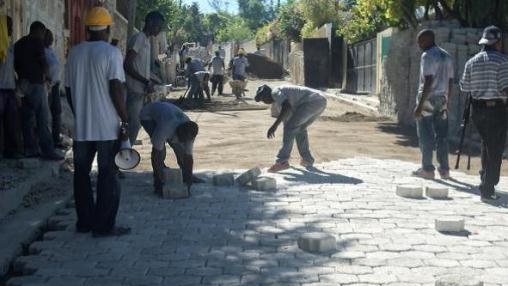Challenges
The January 12, 2010 earthquake was an urban disaster on a massive scale, with the capital of Port-au-Prince and near-by cities being the most affected. The Post Disaster Needs Assessment (PDNA) estimated that about 115,000 houses were destroyed in and around Port-au-Prince, and over 170,000 were damaged, forcing some 1.3 million people to seek shelter in 891 temporary camps. Helping people to move out of those camps and supporting their safe return to their original neighborhoods was one of the most pressing needs post-earthquake, and was also critical to political and social stability in the fragile context of Haiti.
The devastation of the earthquake was compounded by Port au Prince’s density and vulnerability to multiple, natural hazards and the absence of urbanization policy, urban planning, and construction and land-use regulation.
"Building back better" was made even more difficult due to weak capacity at the municipal level, lack of a lead agency mandated to address housing issues, and absence of strategy and incentive to increase the supply of land for construction in urban areas.
Solution
The WB is helping residents of some of the most severely affected areas of Port-au-Prince to return to safer communities, start repairing and rebuilding their homes, and restore their livelihoods.
Because of the complexity of land tenure and challenges of in situ construction of new houses in this dense and hazardous-prone environment, the primary focus is on improving basic neighborhood infrastructure, favoring interventions at the block level, which has also stimulated an increase in available rental housing stock, which is inadequate to meet the needs of people relocating back into neighborhoods. The neighborhood infrastructure improvement include, street lighting, water treatment facility and kiosks, construction of public places, and rehabilitation and concreting of roads, streets, alleys and corridors.
In addition, with 70 percent of the people in camps being renters before the earthquake, the project has also piloted the first rental voucher program in Haiti to support IDPs in move out of camps into rental units in neighborhoods. The success of this approach prompted the Government to significantly scale up this mechanism through its own larger project to support people to move out of camps into neighborhoods.
Results
The main results include:
- 8,700 people returned to safer neighborhoods and provided with safe housing options: a rental subsidy if they did not own a house or repair or rebuilding of their home if they are owners.
- 124,000 people benefitting from community-wide upgrading, including basic infrastructure and services.
- Functioning Community Reconstruction Centre established in all neighborhoods of the projects to provide a one-stop consultation and training, open to all residents, on issues relating to housing repair and reconstruction, new building codes, and prioritization of community infrastructure improvements.
- First ever housing policy was established in May 2013 and validated by the Government in October 2013, as evidence of strengthened Government capacity and leadership to promote safe and improved neighborhood upgrading and housing.
Bank Group Contribution
This IDA grant allowed the Bank to leverage US$65 million Haiti Reconstruction Fund Grant to extend the project activities into other neighborhoods. The Bank provided an additional US$30 million to finance PRODEPUR housing reconstruction activities in October 2010. In addition, the WB mobilized some more funding through the Japanese Social Development Fund to support cash-for-work activities for debris removal. The Spanish Trust Fund for Latin America and the Caribbean, and the Institutional Development Fund financed the formulation of the first housing policy in Haiti and the preparation of reconstruction guidelines, as well as capacity building and exchanges for the newly established housing authority and the strengthening of other housing and urban institutions. The Bank is coordinating a Neighborhood Housing donors group and supports the Housing Sector Table managed by the Government.
Moving Forwards
In light of the program’s success and continued needs on the ground, additional resources are being considered.
Beneficiaries
The program will benefit 270,000 people, through improved neighborhood infrastructure and rental vouchers.
